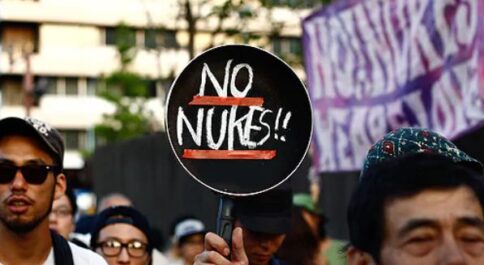A new United Nations treaty bans nuclear weapons. It went into effect this Friday without support from the United States or NATO.
The groundbreaking treaty outlaws production, testing, acquisition, possession, and stockpiling. It also bans signatories from allowing the installation or deployment of nuclear devices on their lands. It also calls on signatories to provide assistance to victims of atomic bombs, as well as begin cleaning contaminated environments.
“For the first time in history, nuclear weapons are going to be illegal in international law,” says Elayne Whyte, former UN ambassador for Costa Rica. “Once you delegitimize that conduct, it completely has an impact on the policymaking process.”
The UN General Assembly approved the 96-page Treaty on the Prohibition of Nuclear Weapons in 2017.
To date, 86 nations have signed the treaty and 51 have ratified it. Though it only affects member nations, the TPNW establishes a new international standard under which all nuclear policies will be judged.
“Nuclear weapons pose growing dangers and the world needs urgent action to ensure their elimination and prevent consequences any use would cause,” says UN Chief António Guterres. “The elimination of nuclear weapons remains the highest disarmament priority of the United Nations. The Secretary-General calls on all States to work together to realize this ambition to advance common security and collective safety.”
The detonation of even a single nuke holds “grave implications for human survival, the environment, socioeconomic development, the global economy, food security, and the health of future generations,” the signatories warned in a statement.
The treaty gives nuclear-armed states the option to “destroy then join” or vice versa, with proceedings verified by an international team.
Notably, none of the world’s nuclear powers (the US, the UK, Russia, China, France, India, Pakistan, North Korea, and Israel) have signed or ratified the treaty. No states that depend on other nations’ nukes for protection (including Japan, Canada, Australia, and South Korea) have signed the treaty either.





Gosh, that was easy. Wonder why they didn’t do that long ago?
Good luck getting China, Russia or N Korea to scrap their nukes which means no one else will except the U.S. as we have someone in office that might.
Great idea, but not very plausible. Did they really think they could get this done China, Russia, Iran and N. Korea? If those countries dismantled theirs and destroyed the components then the US would also, but that ain’t happening.
What 2 countries signed the damn thing? Pelosi wants one when ever she is breathing,we can only hope she quits breathing soon. It’s hard to tell with all the troweled on make up.
The UN can come up with a nuclear weapons ban, but it is totally meaningless if the countries With nuclear weapons do not sign it and scrap their stockpile of weapons. There is no way China, Russia and North Korea will ever get rid of their nukes because they are a symbol of power and leverage on the world stage. The US can Never get rid of ours, because the bad players also will never get rid of theirs. Peace through strength is the ongoing policy we must follow. We are the only country to ever to deploy two atomic bombs and only to end the terrible World War II with the Japanese. Nukes are like fire extinguishers, have them handy but hopefully never have to use them.
What a joke!! Ha, ha, Iran and NK are going to jump on that band wagon!! NOT!!! I BET THEY ARE ROLLING ON THE FLOOR LAUGHING!!!
Yess!!! This is monumental colossal for the safety preservation of human life and our planet as president Trump wishes….